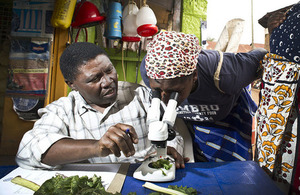UK aid supporting more than 18 million farmers with plant doctors and new satellite ‘pest forecasts’
Space satellite data is being used to predict and prevent pests from ravaging crops and leaving African farmers destitute.

British scientists have developed an early-warning system for farmers using new technology as 40% of crops globally are lost to pests and diseases every year and more than 200 million people in sub-Saharan Africa are undernourished.
Support from the Department for International Development (DFID) has already trained 9,200 people across 34 countries in Africa, Asia and the Americas to be ‘plant doctors’. Plant doctors diagnose signs of pests or disease around the world and provide quick updates to farmers through text messages, radio announcements and TV broadcasts.
Through this work UK aid has reached 18.3 million farmers across 2,800 plant clinics since 2011, and increased farmers’ yields and incomes by 13%, lifting people out of poverty whilst creating stronger, sustainable businesses.
With the UK Space Agency, a new programme is taking this work further. In three pilot countries - Kenya, Ghana and Zambia - UK aid is supporting the use of satellite and meteorological data such as ground and soil temperatures, to forecast when pests or disease may strike, allowing preventative action to be taken.
This data is analysed through the UK’s JASMIN supercomputer at RAL Space, and the forecasts are instantly messaged to plant doctors who can work with farmers to protect their harvest early.
International Development Secretary Penny Mordaunt said:
This is aid in the 21st Century. Using satellites, supercomputers and world-leading British scientists, UK aid is smarter, faster and lifting millions of people out of poverty.
UK aid is right now providing a lifeline to farmers who simply cannot afford a bad harvest. Tracking weather patterns and training up plant doctors to spot deadly pests is saving lives and allowing communities to thrive.
Chief Executive of the UK Space Agency Dr Graham Turnock, said:
The UK has a world-leading space sector, which is playing a significant role in providing innovative, long-term solutions to problems such as those faced by farmers in sub-Saharan Africa.
Through our International Partnership Programme, we are building sustainable relationships between home-grown expertise and developing countries, to help tackle global challenges and provide opportunities for future economic growth.
Supported by the UK Space Agency, the Pest Risk Information Service (PRISE), is expected to increase farmers’ incomes by 5% and reduce crop losses from pest outbreak by 10%.
The initiative has already reached 520 plant doctors and 2,000 farmers with forecasts and predictions about pests which may threaten their crops. One million farmers will receive these predictions by the end of 2021.
When these forecasts are combined with the existing work by plant doctors and plant clinics, the benefits to farmers in terms of yield and income could be even higher - up to 20% on certain crops.
Notes to editors
The Pest Risk Information Service (PRISE) is managed by Centre for Agriculture and Bioscience International (CABI) and is supported with official development assistance (ODA) from the UK Space Agency, a total of £6.3 million.
Total DFID support to the Plantwise programme, managed by CABI, is £24.8 million.
Plantwise:
- Plantwise is a global programme to increase food security and improve rural livelihoods by reducing crop losses across 34 countries.
- Plant clinics are supported by a Plantwise knowledge bank, which provides plant health information, diagnostic resources, pest management advice and data directly to handheld tablets.
- 79% of farmers reported that crop yields increased after using Plantwise advice.
- Pesticide use is lower by plant clinic users (e.g. 40% lower on rice in Thailand and up to 95% lower on perennial crops in Kenya).
- This allows for real-time tracking of pest outbreaks; e.g. the quick response by Plantwise prevented $20 million in crop losses in Sri Lanka to the banana skipper.
Pest Risk Information Service (PRISE)
- PRISE has been launched in Kenya, Ghana and Zambia in 2017. Two more Sub-Saharan African countries to follow in 2019 (Malawi & Rwanda).
- The consortium running PRISE is led by CABI, working with a number of leading UK space experts: Assimila Limited, King’s College London and the Centre for Environmental Data Analysis.
- It uses the capabilities of the Science and Technology Facilities Council and RAL Space, including the JASMIN supercomputer.
- It combines earth observation data, like land use and surface temperatures, and combines this data with intelligence from the ground through ground stations (masts, weather stations) and data loggers (inputting data from crop fields).
- Plant doctors then receive alerts about the risk of pests in their area, and then take preventative action.
UK Space Agency
The UK Space Agency leads the UK efforts to explore and benefit from space. It works to ensure that our investments in science and technology bring about real benefit to the UK and to our everyday lives. The Agency is responsible for all strategic decisions on the UK civil space programme. As part of the Department for Business, Energy & Industrial Strategy, the UK Space Agency helps realise the government’s ambition to grow our industry’s share of the global space market to 10% by 2030.
- supports the work of the UK space sector, raising the profile of space activities at home and abroad.
- helps increase understanding of our place in the universe, through science and exploration and its practical benefits.
- inspires the next generation of UK scientists and engineers.
- regulates and licences the launch and operation of UK spacecraft, launch operators and spaceports.
- promotes co-operation and participation in the European Space Agency and with our international partners.
General media queries (24 hours)
Email mediateam@dfid.gov.uk
Telephone 020 7023 0600
If you have an urgent media query, please email the DFID Media Team on mediateam@dfid.gov.uk in the first instance and we will respond as soon as possible.